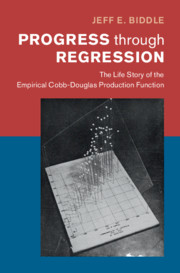Book contents
- Progress through Regression
- Historical Perspectives On Modern Economics
- Progress through Regression
- Copyright page
- Dedication
- Contents
- Figures
- Acknowledgments
- Introduction
- Part I Paul Douglas and His Regression, 1927–1948
- 1 The Origins of Douglas’s Production Function Research Program and His Initial Time Series Studies
- 2 The Douglas–Mendershausen Debate and the Cross-Section Studies
- 3 Theoretical and Econometric Challenges of the Early 1940s, and Douglas’s Final Word
- Part II The Diffusion of the Cobb–Douglas Regression
- Part III Conclusion
- References
- Index
- Historical Perspectives On Modern Economics
1 - The Origins of Douglas’s Production Function Research Program and His Initial Time Series Studies
from Part I - Paul Douglas and His Regression, 1927–1948
Published online by Cambridge University Press: 30 October 2020
- Progress through Regression
- Historical Perspectives On Modern Economics
- Progress through Regression
- Copyright page
- Dedication
- Contents
- Figures
- Acknowledgments
- Introduction
- Part I Paul Douglas and His Regression, 1927–1948
- 1 The Origins of Douglas’s Production Function Research Program and His Initial Time Series Studies
- 2 The Douglas–Mendershausen Debate and the Cross-Section Studies
- 3 Theoretical and Econometric Challenges of the Early 1940s, and Douglas’s Final Word
- Part II The Diffusion of the Cobb–Douglas Regression
- Part III Conclusion
- References
- Index
- Historical Perspectives On Modern Economics
Summary
The chapter puts the orignal Cobb–Douglas paper in the context of Douglas’s previous research and the theoretical frameworks and empirical practices employed by economists in the 1920s. Douglas’s early research with the time series version of the regression is described. During this period, Douglas linked his procedure to the marginal productivity theory of distribution, and presented his research as part of a broader effort to build a quantitative account of economic activity on the “valuable theoretical scaffolding” of neoclassical theory. Several friendly critics saw Douglas’s research program as complementary to their own neoclassical-econometric program, but judged Douglas's methods and results based on what they revealed about the characteristics of firm-level production functions. This issue was never crucial for Douglas, who considered an aggregate production function to be an important theoretical entity worth estimating. However, Douglas regarded these economists as potential allies in his effort to promote his new research technique. It was they who had first labeled the relationship that Douglas was attempting to estimate a “production function”, and after 1935 Douglas adopted this label.
Keywords
- Type
- Chapter
- Information
- Progress through RegressionThe Life Story of the Empirical Cobb-Douglas Production Function, pp. 13 - 58Publisher: Cambridge University PressPrint publication year: 2020



